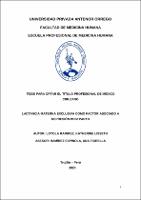| dc.contributor.advisor | Ramírez Espinola, Ana Fiorella | |
| dc.contributor.author | Loyola Ramirez, Katherine Lisseth | |
| dc.creator | Loyola Ramirez, Katherine Lisseth | |
| dc.date.accessioned | 2020-03-04T19:49:51Z | |
| dc.date.available | 2020-03-04T19:49:51Z | |
| dc.date.issued | 2020 | |
| dc.identifier.uri | https://hdl.handle.net/20.500.12759/6027 | |
| dc.description.abstract | Evaluar si la lactancia materna exclusiva es un factor asociado a
depresión postparto.
MATERIAL Y MÉTODOS: Se realizó un estudio transversal analítico, en el cual
participaron 144 mujeres en periodo postparto que acudieron al Hospital Víctor
Lazarte Echegaray durante el periodo enero-marzo 2018 y que cumplieron con
los criterios de selección, y fueron divididas en dos grupos: con lactancia materna
exclusiva y sin ella, y en cada grupo se evaluó la proporción de Depresión
postparto, a través de la aplicación de la Escala de Depresión Postparto de
Edinburgh (EPDS). Se utilizó la prueba estadística Chi cuadrado, además se
calculó la razón de prevalencias.
RESULTADOS: Las mujeres halladas en el estudio con depresión postparto
fueron 27(18.75%), mientras que las que no presentaron depresión postparto
fueron 117(81.25%). La edad promedio de mujeres con depresión postparto fue
de 28.96 ± 5.32 años; asimismo, aquellas sin depresión postparto tuvieron una
edad promedio de 28.91 ±5.91 años. (p>0.05). El promedio del número de hijos
anteriores en las mujeres con depresión postparto fue de 1.04 ± 1.06; mientras
que en las, sin depresión postparto fue de 1.08 ± 1.12. (p>0.05). El estado civil
que predominó tanto en el grupo con depresión postparto como sin él fue el de
conviviente con un número de 16(59.3%) y 66(56.4%) participantes
respectivamente. (p>0.05). El grado de instrucción de las participantes fue
principalmente el nivel superior con un número de 15(55.6%) en las mujeres con
depresión postparto y de 64(54.7%) en el grupo sin él. (p>0.05). En cuanto a la
actividad laboral, 16(59.3%) mujeres con depresión postparto tuvieron una
respuesta negativa, mientras que 11(40.7%) participantes sí se encontraban
realizando actividades laborales. Del mismo modo, en el grupo sin depresión
postparto, prevaleció la ausencia de actividad laboral con 87(74.4%)
participantes, mientras 30(25.6%) participantes dieron una respuesta positiva.
(p>0.05). Las mujeres que practican la lactancia materna exclusiva presentaron
una probabilidad 0.347 veces menor de presentar depresión postparto con respecto a aquellas sin lactancia materna exclusiva (IC95% 0.168-0.719; p 0.05 ) | es_PE |
| dc.description.abstract | To assess if exclusive breastfeeding is a factor associated for
postpartum depression.
MATERIAL AND METHODS: An analytical cross-sectional study was carried
out, in which 144 postpartum women attended the Víctor Lazarte Echegaray
Hospital during the period January-March 2018 and who met the selection
criteria, and were divided into two groups: with exclusive breastfeeding and
without it, and in each group the proportion of postpartum depression was
assessed, through the application of the Edinburgh Postpartum Depression Scale
(EPDS). The Chi square test was used, and the prevalence ratio was calculated.
RESULTS: The women found in the study with postpartum depression were 27
(18.75%), while those without postpartum depression were 117 (81.25%). The
average age of women with postpartum depression was 28.96 ± 5.32 years;
likewise, those without postpartum depression had an average age of 28.91 ±
5.91 years. (p> 0.05). The average number of previous children in women with
postpartum depression was 1.04 ± 1.06; while in those without postpartum
depression it was 1.08 ± 1.12. (p> 0.05). The marital status that predominated
both in the group with postpartum depression and without it was that of cohabiting
with a number of 16 (59.3%) and 66 (56.4%) participants respectively. (p> 0.05).
The educational level of the participants was mainly the upper level with a number
of 15 (55.6%) in the women with postpartum depression and 64 (54.7%) in the
group without it. (p> 0.05) Regarding work activity, 16 (59.3%) women with
postpartum depression had a negative response, while 11 (40.7%) participants
were doing work activities. Similarly, in the group without postpartum depression,
the absence of work activity prevailed with 87 (74.4%) participants, while 30
(25.6%) participants gave a positive response. (p> 0.05). Women who practice
exclusive breastfeeding had a 0.347 times lower probability of presenting
postpartum depression than those without exclusive breastfeeding. (95% CI:
0.168-0.719; p <0.05). | en_US |
| dc.description.uri | Tesis | es_PE |
| dc.format | application/pdf | es_PE |
| dc.language.iso | spa | es_PE |
| dc.publisher | Universidad Privada Antenor Orrego | es_PE |
| dc.relation.ispartofseries | T_MED.HUMA_2715 | |
| dc.rights | info:eu-repo/semantics/openAccess | es_PE |
| dc.rights.uri | https://creativecommons.org/licenses/by/4.0/ | es_PE |
| dc.source | Universidad Privada Antenor Orrego | es_PE |
| dc.source | Repositorio Institucional - UPAO | es_PE |
| dc.subject | Lactancia materna exclusiva | es_PE |
| dc.subject | Depresión postparto | es_PE |
| dc.title | Lactancia materna exclusiva como factor asociado a depresión postparto | es_PE |
| dc.type | info:eu-repo/semantics/bachelorThesis | es_PE |
| thesis.degree.level | Título Profesional | es_PE |
| thesis.degree.grantor | Universidad Privada Antenor Orrego. Facultad de Medicina Humana | es_PE |
| thesis.degree.name | Médico Cirujano | es_PE |
| thesis.degree.discipline | Medicina Humana | es_PE |
| dc.subject.ocde | https://purl.org/pe-repo/ocde/ford#3.02.27 | es_PE |
| renati.type | https://purl.org/pe-repo/renati/type#tesis | es_PE |
| renati.level | https://purl.org/pe-repo/renati/level#tituloProfesional | es_PE |
| renati.discipline | 912016 | es_PE |
| dc.publisher.country | PE | es_PE |


